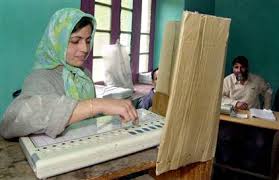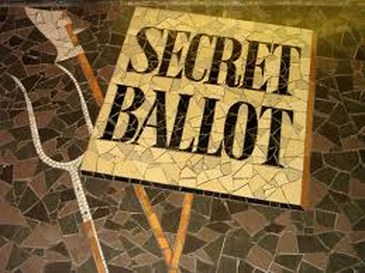 Conservatives in the US have been at the forefront of legislating voter identification laws in individual states. Proponents use the argument of preventing voter fraud, which is akin to buying votes, but the reality is less than one percent of US voters have ever been prosecuted for voter fraud. So that leaves preserving the secret ballot to prevent voter intimidation and privacy, but does the secret ballot promote social justice and public responsibility? In modern times casting secret ballots is universally practiced and most voters would not consider any other methods in a general public election. Other voting methods like in the US Congress, the voting takes place orally and in public using a roll call. This is far from the ancient Greeks who used pebbles to cast votes. The ancient Greek polis or city-state was considered inclusive because they allowed poor males born in the polis to vote despite their low socioeconomic status; however, women were not allowed to vote. This kind of direct democracy meant citizens could vote directly on an issue, instead of through a representative. Greek voters deposited a pebble into one of two urns to mark their choice; after voting, the urns were emptied onto counting boards for tabulation. The principle of secret voting was established by at least the 5th century BCE, and Athenians may have used a contraption to obscure the urn into which a voter was placing his hand. Do we need secrecy? In the United Kingdom the use of numbered ballot paper has come under criticism because of the possibility that the number can be linked to the elector or voter. On Election Day, a voter is given ballot paper and the number is noted on a counterfoil of ballot paper putting secrecy in question based on access to the ballot box. Reportedly polling station officials could share voting results of individual electors with non-officials for dubious reasons. If there is an allegation of fraud or false ballots, the process of matching ballots to voters can be done if the “Election Court” deems it necessary. The main criticism is lax security when the authorities match ballot papers to voters without the court’s permission. In the United States the US Constitution does not grant a right to a secret ballot. That right is reserved to individual states. At polling locations as well as absentee mailed in ballots, the ballots are numbered which makes them traceable certifying that the ballot was cast by a registered voter and not fabricated. A single ballot consists of a stub and the actual ballot in which a shared number is printed. The numbered stub is retained as voting proof in case of a recount. Considerations for “open voting” There are pros and cons to secret voting and even proposals for “open voting.” One group of academicians at the University of Amsterdam proposed “open voting” as beneficial. In the paper “Against the Secret Ballot: A new proposal for open voting,” they argued together with others that people should not cast their vote to further their own interests—which is fostered by a secret ballot—but rather form judgments based on the common good. Using the judgment ideal does not present the same issues as the “preference” ideal symbolized by secret voting. The secret ballot encourages personal, self motivated expressions about society. On the other hand, open voting in aggregate encourages public-spirited behavior central to furthering the judgment ideal and the common good. The reason they argue in favor of a public ballot, rather than secret, is to foster the desire for social good, and mutual consent in society that plays a larger role in how we ultimately cast our vote. In a pluralistic society the best way to win social acceptance is to vote in a public-spirited way that benefits the common good of everyone. John Rawls’ political philosophy described in the principles of social justice teaches that society should function to benefit the least advantaged, which supports the concept of open voting encouraging social fairness. The cons for open voting are centered on public shaming and stigmatization. Social stigma could be attached to a person if they identified with a particular group such as a conservative or environmentalist as revealed by their voting practices. Similarly political views might need protection from public knowledge due to personal or professional affiliations. Open voting might also encourage inaccurate caricatures. And some might feel inadequate exposing inability to articulate intelligent, cognitive and rhetorical arguments to justify their political views. The Amsterdam researchers use the “observer effect” as one justification for open voting stating that the probability of being exposed can have an impact on behavior encouraging people to act for the common good, rather than self interests. They proposed a Justification Day where voters are reminded at the polls they might be called on to participate in a justificatory assemble in order to trigger public-spirited ballot responses where they will be accountable for voting choices. It’s fairly certain that despite its flaws, voting by secret ballot is not going to be overturned any time soon. But there have been discussions for years among academics about a better, more socially responsible method for casting one’s vote. Open voting gives us something to think about particularly with the propositions for online voting becoming more popular and questions of privacy enter the conversation. Resources http://blogs.getty.edu/iris/voting-with-the-ancient-greeks/ http://en.wikipedia.org/wiki/Secret_ballot http://www.academia.edu/4411987/Against_the_Secret_Ballot
5 Comments
Eileen
27/4/2015 03:38:04 pm
Thanks for a food for thought report Dava.
Reply
Dava Castillo
27/4/2015 08:36:43 pm
Thank you for the thoughtful reply Eileen.
Reply
Julia
27/4/2015 07:36:43 pm
I think if there is ever a push to get rid of secret voting, some people will just not vote at all. Already there is so much vitriol in US politics, and a never ending election cycle. At the last minute some people will decide to vote, and this is already made difficult in some cases. Some counties now make you pay for postage, while for others it is free.. Also, proposing to get rid of the secret ballot would imply we do away with mail in ballots. It makes no sense. A lot of people do not want to vote out in the open, and any push for that is just too pushy.
Reply
Julia
27/4/2015 07:38:33 pm
I meant having to pay postage for a mail in ballot. This is another thing that will deter a would be voter from voting.
Reply
Dava Castillo
27/4/2015 08:42:55 pm
Thank you for reading and commenting Julia.
Reply
Leave a Reply. |
Dava Castillo
is retired and lives in Clearlake, California. She has three grown
children and one grandson and a Bachelor’s degree in Health Services
Administration from St. Mary’s College in Moraga California. On the
home front Dava enjoys time with her family, reading, gardening, cooking
and sewing. Archives
November 2015
|


